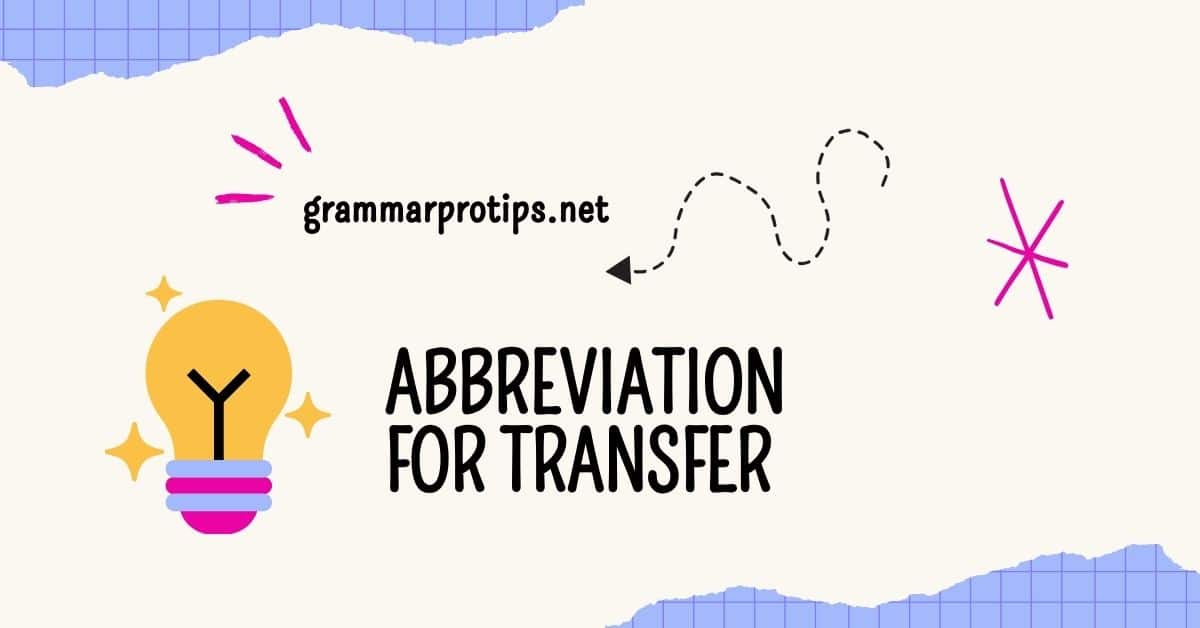Abbreviation For Transfer?: Abbreviations are a critical aspect of communication in both personal and professional environments, helping to simplify and speed up the process of conveying complex ideas.
Among the most commonly used abbreviations is “transfer,” a word with diverse applications in different fields, from business and finance to education and logistics.
But what’s the abbreviation for transfer? And how do we use it effectively in different scenarios?
In this article, we will thoroughly explore the transfer abbreviation, its definition, pronunciation, and provide numerous examples of how it is applied in various real-life contexts.
By the end of this guide, you’ll be well-versed in the different ways transfer is used in both its full and abbreviated forms.
What Is the Meaning of Transfer?
Before diving into abbreviations, it’s important to grasp the full transfer meaning.
Transfer refers to the act of moving something from one place to another, whether it’s physical objects, money, data, or responsibilities.
The concept of transfer can be applied in various domains, such as:
- Finance: Moving money or funds from one account or person to another.
- Business: Shifting assets, ownership, or responsibilities from one individual or company to another.
- Logistics: The movement of goods, either within a warehouse or between locations.
- Education: Relocating a student from one educational institution to another.
- Technology: The movement of data, such as through data transfer protocols.
Transfer Definitions Across Different Fields
Transfer in Business
In the business world, transfer in business is a broad term that encompasses the movement of assets, property, or responsibilities between individuals or companies.
Whether it’s transferring ownership of a company or transferring financial assets, this process plays a pivotal role in business operations.
Transfer in Finance
The most common use of the word transfer in finance is when funds are moved from one account to another. This can be done between individuals, companies, or institutions.
The transfer of funds is often tracked via transaction references in banking systems or using digital payment systems like SWIFT.
Transfer in Logistics
In logistics, transfer in logistics involves the movement of goods.
This can include the transportation of goods from one location to another, warehousing, and inventory management.
Goods transfer is a crucial part of global trade and supply chain management.
Transfer in Education
In the educational context, student transfer refers to a student’s transition from one school or university to another.
This might be due to academic needs, personal preference, or changes in geographic location.
The transfer process in education often involves various steps such as paperwork, approval, and course adjustments.
Transfer in Technology
When discussing data transfer, we refer to the transmission of data between devices or over networks.
Data transfer plays a significant role in digital communication, from sending files over the internet to syncing data between devices.
Technologies like FTP (File Transfer Protocol) are used to manage these processes securely.
Abbreviation for Transfer: Common Short Forms
Now that we understand the concept of transfer, let’s look at its various abbreviations.
These shortened forms help in communication, especially in cases where space is limited, such as in emails, text messages, or within specific industries.
1. TRANSF
TRANSF is a common abbreviation for transfer, typically used in business communication, especially in banking and finance.
This abbreviation helps save time when referring to transactions involving the movement of money, assets, or responsibilities.
2. Xfer
One of the most popular abbreviations, Xfer, is widely used in various industries, especially in technology and finance.
This informal abbreviation for transfer is often found in digital communication or casual emails.
For example, Xfer can refer to moving files via FTP or transferring money from one account to another.
3. TRF
The abbreviation TRF is commonly used in business and banking, particularly when referring to financial transactions or transfers of funds.
It is also found in transaction logs, email communications, or invoices when tracking or documenting payments or other types of asset transfers.
4. TX
TX is another shorthand abbreviation used mainly for transaction or transfer.
It’s particularly common in finance and banking communication and can be used to refer to a money transfer or the act of conducting a financial transaction.
It is often used in quick exchanges, such as emails or text messages.
5. TR
In some contexts, TR is used as an abbreviation for transfer, but it’s less common than the other abbreviations mentioned above.
It can appear in informal or shorthand communication, especially when referring to the transfer process.
Common Abbreviations for Transfer
| Abbreviation | Full Form | Common Usage |
|---|---|---|
| TRANSF | Transfer | Common in finance and business contexts |
| Xfer | Transfer | Widely used in informal digital communications |
| TRF | Transfer | Used in business and banking, especially for financial transactions |
| TX | Transaction/Transfer | Common in banking and financial transaction contexts |
| TR | Transfer | Less common, used in informal communications |
Transfer Pronunciation and How to Say It
The pronunciation of transfer and its abbreviations can sometimes be confusing, especially when dealing with shortened forms. Here’s a quick guide:
- Transfer is pronounced as /trænsˈfɜːr/. The “trans” part rhymes with “fans,” and the “fer” part is pronounced like “fur.”
- Xfer is pronounced as “ex-fer”, breaking it into two syllables.
- TRF is pronounced as “T-R-F”, saying each letter individually.
- TRANSF is pronounced as “trans-f”, without the final “er.”
How to Use Transfer Abbreviations in Different Scenarios
To truly understand how these abbreviations work, let’s explore various scenarios in real-life contexts where transfer is used.
Example 1: Financial Transfer
Subject: Successful Money Transfer Notification
Hi Sarah,
I’m writing to confirm that the money transfer of $5,000 to your bank account has been completed. The transaction reference is TRF12345, and the funds should be available within the next 24 hours.
If you have any questions or need further details about the transfer of funds, feel free to contact me anytime.
Best regards,
James Richardson
In this example, James uses TRF as shorthand for transfer. It’s efficient and clear, especially in financial contexts, where multiple transfers may be taking place.
Example 2: Goods Transfer in Logistics
Subject: Update on the Goods Transfer Status
Hello Emily,
Just a quick update on the goods transfer from our warehouse in Dallas to the Los Angeles distribution center. The shipment is on schedule and is expected to arrive by the end of this week.
We have tracked the Xfer number 123456789, and you can follow its progress through the provided link.
Best,
Tom
Here, Tom uses Xfer to refer to the transfer process of goods. The abbreviation is helpful for brevity in an otherwise detailed communication.
Example 3: Student Transfer in Education
Subject: Student Transfer Request Processing
Dear Dr. Harris,
I hope you are well. I’m contacting you regarding the student transfer request of Anna Lee. She has expressed a desire to move from our institution to the University of Southern California. We are currently processing her request and reviewing her academic records.
We’ll send you the required documents for approval within the next few days.
Sincerely,
Julia Weston
Registrar’s Office
In educational settings, student transfer is common, and abbreviations like Xfer might be used internally to refer to the process.
Example 4: Data Transfer in Technology
Subject: Data Transfer Confirmation
Hello Ben,
I wanted to confirm that the data transfer from your old server to the new cloud platform has been successfully completed. All files have been securely uploaded, and you should be able to access them from any device now.
If you experience any issues with the file transfer protocol (FTP) or need additional support, please don’t hesitate to get in touch.
Best regards,
Liam
For data transfer or file transfer, Xfer is often used informally, especially in technology-related communication.
Informal Abbreviations for Transfer
In informal communication, especially when texting or emailing colleagues in a more relaxed tone, abbreviations like Xfer are often used.
These abbreviations help save time and reduce the formality of the message.
For instance:
“Hey, I’ve Xfer’d the report to you. Let me know if you need anything else.”
This informal style of communication is common in tech, business, and casual environments.
Transfer in Various Sectors
Transfer in Business
In business, especially in financial and operational contexts, transfer can refer to a wide range of processes.
Xfer and TRF are commonly used in emails or documents related to financial transactions, asset transfers, and other business deals.
Transfer in Education
In the education sector, the student transfer process is crucial for accommodating students who need to switch schools or universities.
Whether it’s for academic reasons or a personal choice, understanding the transfer process and the terminology used in these situations can help educators and administrators manage the transition smoothly.
Transfer in Technology
In technology, data transfer is a critical process, especially with the increasing demand for online services and cloud storage.
Abbreviations like Xfer and FTP (File Transfer Protocol) are standard terms used in the industry to handle large volumes of data transfer between servers, devices, and networks.
Transfer Synonyms and Antonyms
Synonyms of Transfer
Understanding the synonyms of transfer can help you choose the right word for your context. Some common synonyms include:
- Move
- Shift
- Relocate
- Transmit
- Send
- Pass
- Deliver
Each of these terms might be more appropriate in certain contexts.
For example, in a formal setting, “shift” might sound better than “move,” while “send” might be the best option in communication scenarios.
Antonyms of Transfer
Antonyms of transfer are words that describe the opposite action, such as:
- Retain
- Keep
- Hold
- Withhold
These words indicate the opposite of moving something or someone from one place or owner to another.
Conclusion
Mastering the use of the abbreviation for transfer is a valuable skill in various fields, from financial transactions to data transfers and goods transfer.
By understanding the different forms of transfer abbreviations, such as Xfer, TRF, and TRANSF, you can streamline your communication and ensure that your messages are clear and concise.
Whether you’re handling a student transfer, managing data transfer, or simply moving funds between accounts, knowing how to use transfer abbreviations effectively will save you time and improve the efficiency of your communication.
Read more knowledgeable blogs on Grammar Pro Tips

Sienna Mauldon is a passionate writer and grammar expert. On her blog, she shares easy-to-follow guides to help readers master grammar rules and improve their writing. With a love for language and teaching, Sienna makes grammar simple and fun for everyone, from beginners to experienced writers.








